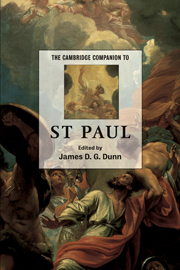Book contents
- Frontmatter
- Introduction
- Part I Paul’s life and work
- Part II Paul’s letters
- 3 1 and 2 Thessalonians
- 4 Galatians
- 5 1 and 2 Corinthians
- 6 Romans
- 7 Philippians
- 8 Colossians and Philemon
- 9 Ephesians
- 10 The Pastoral Epistles
- Part III Paul’s theology
- Part IV St Paul
- Select bibliography
- Index of References
- General Index
5 - 1 and 2 Corinthians
from Part II - Paul’s letters
Published online by Cambridge University Press: 28 May 2006
- Frontmatter
- Introduction
- Part I Paul’s life and work
- Part II Paul’s letters
- 3 1 and 2 Thessalonians
- 4 Galatians
- 5 1 and 2 Corinthians
- 6 Romans
- 7 Philippians
- 8 Colossians and Philemon
- 9 Ephesians
- 10 The Pastoral Epistles
- Part III Paul’s theology
- Part IV St Paul
- Select bibliography
- Index of References
- General Index
Summary
Paul's choice of Corinth as his first missionary base reveals much about his character and temperament. A city which took pride in the slogan, 'Not for everyone is the journey to Corinth' (Horace, Epistles 1.17.36; cf. Strabo, Geography 8.6.20) was above all a challenge. A challenge that Paul was prepared to accept because if he won he would have planted the gospel in the most difficult of all environments, a fiercely competitive commercial centre where material gain was the one true god. To be able to say that Corinthians believed in Jesus would be irrefutable proof of the power of the gospel.
Corinth, moreover, offered Paul superb communications. Its position on the isthmus linking the Peloponnese to mainland Greece gave it command over the north–south trade route as well as over the east–west sea traffic. The taxes it levied made it ‘wealthy Corinth’ (Homer, Iliad 2.570). (For more background on the city see my St. Paul’s Corinth.)
Arriving in Corinth from Athens in the spring of AD 50, Paul found lodging and work with Prisca and Aquila, Jewish Christians who had fled from Rome as the result of reprisals taken by the Emperor Claudius against a turbulent synagogue in AD 41 (many continue to prefer the less probable date of AD 49). Corinth was an ideal city for all three to ply their trade of tentmaking.
- Type
- Chapter
- Information
- The Cambridge Companion to St Paul , pp. 74 - 90Publisher: Cambridge University PressPrint publication year: 2003

